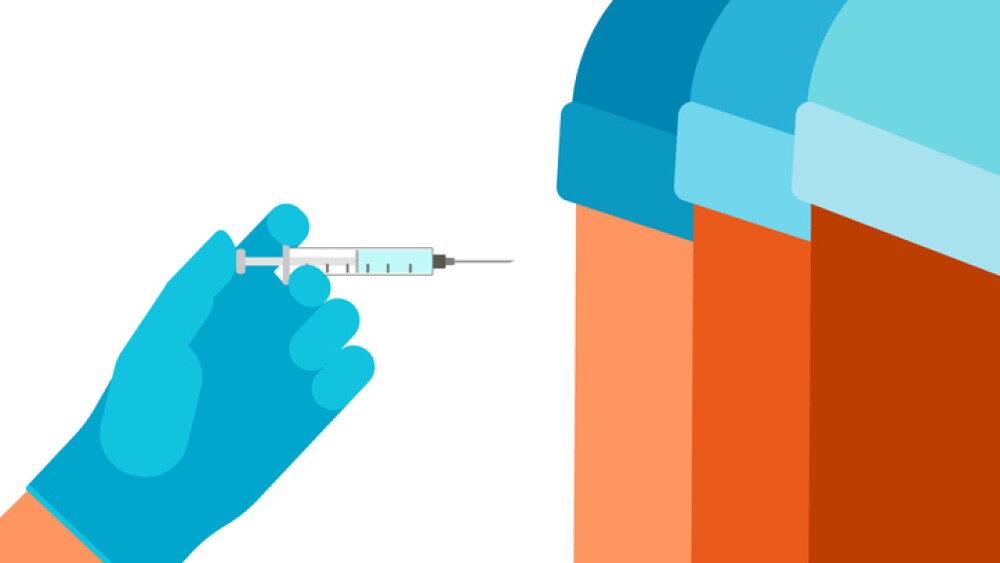A detailed analysis of these results was presented today at an oral session of the EASL (European Association for the Study of Liver disease) annual meeting held in Copenhagen. The TG4040 Phase I data are as follows:
• All studied doses were safe and well-tolerated. The most frequent adverse events were minor to moderate injection site reactions and influenza-like symptoms. No adverse event leading to discontinuation or treatment modification and no serious adverse event related to TG4040 were reported.
• Overall, 6 out of 15 patients experienced a decrease in viral load ranging from 0.5 to 1.4 log10 IU / mL from baseline.
• For the 2 patients showing the most significant viral load reduction (0.8 and 1.4 log10), this decrease coincided with an increase of vaccine-specific T-cell response (up to three times baseline levels). Furthermore, for one of those two patients, IFN-gamma-producing cells peaked one to two weeks after the third injection and remained detectable until the last follow-up analysis (six months), while during the same period the viral load remained significantly low. For those patients with no or minimal change in viral load, no immune responses to NS3 and NS4B viral antigens related to the vaccine, or to NS5A non-related to the vaccine were detectable by IFN-gamma ELISpot at any time during follow up.
Philippe Archinard, Chief Executive Officer of Transgene, stated: “These additional Phase I results are encouraging as they support the expected mechanism of action of TG4040 that aims at inducing an effective HCV-specific T cell-based immune response associated with the control of viral replication. The data also confirm the very good safety profile of TG4040. This promising exploratory study allows us to actively prepare the next clinical steps, which will involve the initiation of a large proof of concept controlled Phase II clinical trial that will seek to demonstrate synergy of TG4040 in combination with standard of care. We anticipate the product’s entry into this controlled Phase II trial early next year.”
About the TG4040 Phase I Trial programme
The current trial is an open-label, multi-centre, dose-escalation study testing the safety and biological activity of TG4040 in treatment-naive patients chronically infected by HCV (genotype 1).The trial is being conducted in three clinical sites in France and enrolled 15 treatment-naive patients chronically infected with the genotype 1 HCV. The patients received three weekly subcutaneous injections of TG4040. Dosing was escalated from 106pfu (cohort 1 = three patients), to 107 pfu (cohort 2 = three patients), and to 108 pfu (cohort 3 = nine patients). Patients treated with the highest dose also received a boost injection of TG4040 at month 6.
In March 2008, the study was extended to include 27 patients in 3 additional cohorts. This extension aimed at fine-tuning the timing of the boost with cohorts 5 and 6 receiving boost injection respectively at 2 and 4 months, and at evaluating safety in more advanced liver diseases in cohort 4. Fourteen additional patients have been included in the study so far. We anticipate results of the study extension in the third quarter 2009.
In January 2006, Transgene was awarded a €1.3 million grant by the Lyonbiopôle Competitiveness Cluster for the development of its therapeutic vaccine TG4040 against hepatitis C chronic infection. The funding, which originates from the French Ministry of Industry, is expected to cover approximately 30% of the research and development costs for the programme.
Another Phase I trial is being conducted in Canada and involves the treatment of 24 patients that are chronically infected with the Hepatitis C Virus (HCV) and who have relapsed after standard treatment with ribavirin and pegylated interferon alpha. The trial is sponsored by the University of Montreal and supported by the Canadian Network for Vaccines and Immunotherapies. Availability of safety data as well as preliminary viral and immunological data is planned by the end of 2009.
About TG4040
Transgene’s TG4040 product is based on the MVA virus carrying and expressing non-structural proteins (NS3, NS4 and NS5B) of the hepatitis C virus. The MVA vector is a highly attenuated strain of vaccinia virus that combines an extensive history of safety with the ability to stimulate a strong immune response to antigens.
About chronic Hepatitis C
Hepatitis C currently represents a major public health concern. The number of persons chronically infected with HCV in the world is estimated at 170 million to 200 million and hepatitis-C-related deaths at approximately 470 000 annually. Peak of incidence of HCV-related diseases is expected to occur in 2025-2030 in developed countries. HCV infection leads to liver diseases such as fibrosis, cirrhosis and liver carcinoma which are the prime reasons for liver transplants. The current standard of care for patients infected with the HCV genotype 1 (a combination of pegylated interferon alpha and ribavirin) is lengthy, often poorly tolerated and at most effective in 50% of patients completing therapy. In addition, a substantial number of patients never receive therapy. Therefore, there is a strong medical need for new alternative approaches, including combination therapies.
About Transgene
Transgene is a France-based biopharmaceutical company dedicated to the development of therapeutic vaccines and immunotherapeutic products in oncology and infectious diseases. The company has three compounds in Phase II trials (TG4001/R3484, TG4010 and TG1042) and one compound in Phase I studies (TG4040). Transgene has concluded a strategic partnership agreement with Roche for the development of its TG4001/R3484 therapeutic vaccine to treat HPV-mediated diseases. Transgene has bio-manufacturing capacities for viral-based vectors and technologies available for out-licensing. Additional information about Transgene is available on the Internet at www.transgene.fr.
Cautionary note regarding forward-looking statements
This press release contains forward-looking statements referring to the planned clinical testing and development of one of Transgene’s therapeutic vaccine candidates. However, clinical testing and successful product development depend on a variety of factors, including the timing and success of future patient enrolment and the risk of unanticipated adverse patient reactions. Results from future studies with more data may show less favorable outcomes than prior studies, and there is no certainty that product candidates will ever demonstrate adequate therapeutic efficacy or achieve regulatory approval or commercial use. For further information on the risks and uncertainties involved in the testing and development of Transgene’s product candidates, see Trangene’s Document de référence on file with the French Autorité des marchés financiers on its website at http://www.amf-france.organd Transgene’s website at www.transgene.fr.




